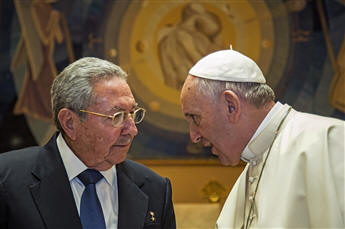Liberation Theology's Comeback Comes wth a KGB Caveat
IBDEditorials.com

In an unusual drop-in,
Pope Francis on Sunday met for an hour with Cuba's
Raul Castro, leaving the latter gushing.
Marxism: As Cuba's Raul Castro declares he may return to the Catholic Church, a top Soviet bloc defector has warned that the liberation theology now making a comeback there was actually a KGB creation. Can the truth get out?
The declaration the iron-fisted Cuban autocrat made after his Sunday meeting with Pope Francis was played up in the press as another example of the latter's sunny way with even the most difficult people. But Castro's promise was qualified: He'll only return "if the pope continues in this way."
It was an unmistakable reference to the Catholic Church's apparent re-welcoming of liberation theology, the unholy theology that during the 1960s and 1970s married the politics of materialism, collectivism, envy and class warfare of Marxism with Christianity itself.
Up until now, it had been declared "heresy" by Pope Benedict and its advocacy discouraged by the church.
The "rifles and cassocks" picture of the church it created, as Carlos Alberto Montaner, Alvaro Vargas Llosa and Plinio Apuleyo Mendoza wrote about in their "Guide to the Complete Latin American Idiot," was key in keeping that region poor and underdeveloped.
What's more, it was a creation of western intellectuals, not a grass-roots movement, according to then-Cardinal Ratzinger, who later became Pope Benedict. Its U.S. variants include the black liberation theology of Obama's controversial Chicago preacher, Rev. Wright, and assorted feminist varieties of the same name.
Since Raul hasn't changed — and already has warned Cubans that his opening to the U.S. would not lead to an end to communism — the sour conclusion can only be that the church's softening attitude toward liberation theology makes him feel right at home.
A few days before the pope met Castro, he had a cordial meeting with Peruvian priest Gustavo Gutierrez, who, as the self-declared founder of liberation theology, had long been on the outs with the church. The fact that there is a museum in Peru devoted to the horrors of communism, including its liberation theology variant, prominently displaying pictures of university intellectuals promoting the cross and the hammer and sickle between photos of mass graves, pretty well tells of the effects of this pernicious idea.
A few months prior to that, Miguel d'Escoto, the Sandinista revolutionary who expounded liberation theology as a priest and turned Nicaragua into a Cuban-ruled hellhole, got his priestly title back, too.
And that brings up the truth about liberation theology: Far from being a philosophy of helping the poor as claimed, it was really a Soviet propaganda project.
Ion Mihai Pacepa, who headed Romania's intelligence service and defected to the West as its highest-ranking official in the late 1970s, has come out with new revelations about how the entire idea was a KGB creation with the explicit purpose of weakening the West.
"The movement was born in the KGB, and it had a KGB-invented name: Liberation Theology," he told the Catholic News Service. "During those years, the KGB had a penchant for 'liberation' movements." It was the work of a secret disinformation program approved by the chairman of the KGB and Politburo, he said.
The aim wasn't to help the poor, but to increase Soviet power. With a history like that, it can't lead to anything good, given the nasty results of communism.
The church is free to embrace any idea it wants.
But the truth needs to be known. Raul Castro, who
was there from the beginning, already knows what it
is.

